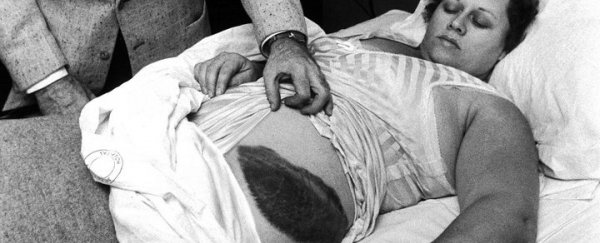
On a crisp November afternoon in the small town of Sylacauga, Alabama, in 1954, Ann Hodges was napping on the couch when a softball-sized chunk of rock crashed through the ceiling, bounced off her radio and hit her in the hip.
Other than the roughly 30-cm bruise above her hip that you can see being examined by doctor Moody Jacobs above, Ann was relatively uninjured.
But the attention that followed was so intense that she ended up being admitted to hospital. Not only had she potentially been hit by a meteorite, but she was also struck during a period of Cold War hysteria - and in her small town, this sent neighbours flocking to her house, convinced the object had been sent by the Soviet Union.
Earlier that day, people in Sylacauga had seen a "bright reddish light like a Roman candle trailing smoke" according to an Alabama Museum of Natural History publication. Others had seen a fireball "like a gigantic welding arc". But the cause was unclear.
A government geologist was sent in to inspect the object and eventually determined that it was a meteorite, and not a communist weapon. But that was even more rare, and Ann became the only cofirmed person in human history to have been struck by a meteorite.
As Michael Reynolds, an astronomer from Florida State College, told Justin Nobel for National Geographic, being hit by a meteorite is an incredibly unlikely event.
"Think of how many people have lived throughout human history," Reynolds told Nobel. "You have a better chance of getting hit by a tornado and a bolt of lightning and a hurricane all at the same time."
But unfortunately, the meteorite continued to cause drama. Although the government agreed to give it back to Ann and her husband Eugene, the couple were renters, and so their landlord sued them for custody of the space rock.
After much public fighting, Eugene and Ann did end up with the meteorite, and in 1956 donated it to the natural history museum, where it's still on display.
But the frenzy had taken its toll, and Nobel reports that Ann later suffered a nervous breakdown and died at the age of 52 of kidney failure.
Read Nobel's excellent feature on the meteorite strike over at National Geographic to find out more.
Sources: National Geographic, Corporis Fabrica/Tumblr
